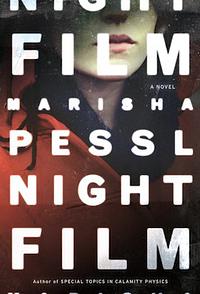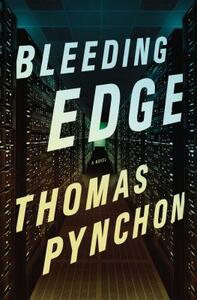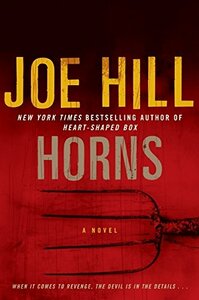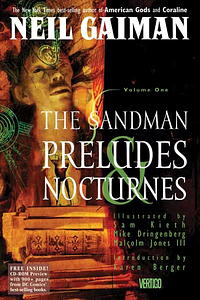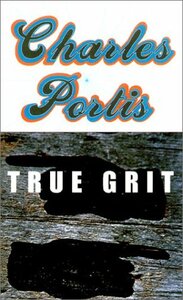Take a photo of a barcode or cover
matthewcpeck's reviews
586 reviews
'Night Film' is marketed as a "literary" genre book. It has that literary spirit, but the prose and dialogue are disappointingly of the paperback thriller sort. Over-explanations and clunky expositions abound. Nobody would actually say "Startled, I glanced behind me" in conversation. Admittedly I haven't read Marisha Pessl's earlier work, so this could all be part of a deliberately constructed narrative voice. Speaking of narrators, though, I'm reminded of the increasing absurdity of a protagonist that's been unemployed for years yet still manages to afford a 2-floor (!) apartment in Manhattan, an assistant with salary & bonuses, and endless amounts of bribe money...throwaway line about "life savings" notwithstanding.
But this is still a good book, and the story moves at such an unpredictable and relentlessly compelling clip that I forgot my gripes. It begins almost in a stylistic homage to CITIZEN KANE: a mysterious prologue followed by a mock internet slideshow, the first of many constructed screenshots and documents throughout. Hopeless film nerds like me can't help but be drawn towards the tale of a legendary horror auteur whose cult grows in direct proportion to his reclusiveness. And just when I thought things were wrapped up too neatly, Pessl's haunting ending left me mildly stunned.
An ideal Halloween book.
But this is still a good book, and the story moves at such an unpredictable and relentlessly compelling clip that I forgot my gripes. It begins almost in a stylistic homage to CITIZEN KANE: a mysterious prologue followed by a mock internet slideshow, the first of many constructed screenshots and documents throughout. Hopeless film nerds like me can't help but be drawn towards the tale of a legendary horror auteur whose cult grows in direct proportion to his reclusiveness. And just when I thought things were wrapped up too neatly, Pessl's haunting ending left me mildly stunned.
An ideal Halloween book.
I'm having difficulty rating this one. Let's say 3 1/2 stars? America's most mysterious writer, now in the 50th year of his career, takes on NYC in 2001. Its heroine is the spirit of a smartass film noir PI in the person of a middle-aged, divorced, Jewish fraud examiner and mother: the likable Maxine Tarnow. In the classic noir/mystery mold, a small investigation mushrooms into something bizarre and convuluted. And then 9/11.
In addition to Pynchon's trademark paranoia, punnery, and obscure allusions, there is a surprising amount of ordinary, domestic-type scenes: family gatherings, meals, TV-watching, etc. I liked these, and I loved the eerie, sinuous passages on islands of garbage outside Manhattan and the Mayan underworld - I should've written some lines down. But some of the comedy is smug and tiresome. And although the tech-sector setting is amazingly well-researched, with references to Hydro Thunder and 'massively multiplayer', it has that recognizable feel of coming from a guy who's done his reading but hasn't actually PARTICIPATED in the stuff.
Still: BLEEDING EDGE expresses that feeling of reality turned inside-out that hit after 9/11 in a way that no other living writer can. I just wish there was more of that expression and less reference humor.
In addition to Pynchon's trademark paranoia, punnery, and obscure allusions, there is a surprising amount of ordinary, domestic-type scenes: family gatherings, meals, TV-watching, etc. I liked these, and I loved the eerie, sinuous passages on islands of garbage outside Manhattan and the Mayan underworld - I should've written some lines down. But some of the comedy is smug and tiresome. And although the tech-sector setting is amazingly well-researched, with references to Hydro Thunder and 'massively multiplayer', it has that recognizable feel of coming from a guy who's done his reading but hasn't actually PARTICIPATED in the stuff.
Still: BLEEDING EDGE expresses that feeling of reality turned inside-out that hit after 9/11 in a way that no other living writer can. I just wish there was more of that expression and less reference humor.
Joe Hill's second novel is a psychological character study spiced with fantasy, rather than the other way around. The central story is so affecting, humanistic, and funny that I was a bit disappointed in the cartoonishly over-the-top goriness of the climax, which felt like it was inserted as a contractual obligation to please horror fanatics.
The niftiest thing about HORNS, apart from the fable-like premise, is the nonlinear way that the story unfolds, jumping around in chronology and pulling out various rugs from underneath the reader. Not to mention that 'horns' are present in their biological and musical incarnations. And it's set in NH.
Aside from some weaker prose and plotting in the third act, this is good, thoughtful, inventive weird fiction from a wonderful New England fabulist. Bonus - includes a great description of the Beatles discography.
The niftiest thing about HORNS, apart from the fable-like premise, is the nonlinear way that the story unfolds, jumping around in chronology and pulling out various rugs from underneath the reader. Not to mention that 'horns' are present in their biological and musical incarnations. And it's set in NH.
Aside from some weaker prose and plotting in the third act, this is good, thoughtful, inventive weird fiction from a wonderful New England fabulist. Bonus - includes a great description of the Beatles discography.
3 1/2 stars.
The two overwhelming impressions I'm left with upon finishing Zuckoff's book? 1) Greenland is a horrible, horrible place. 2) My petty complaints about a cold office or a patchy cell phone network are really, truly petty.
There are 2 stories being told here: the primary one being a narrative about a series of Allied plane crashes and rescue attempts in Greenland during the winter of 1942-43 that makes the events of Zuckoff's previous 'Lost In Shangri-La' look like spring break in Cancun. The second is an account of Zuckoff accompanying an expedition to recover the remains of Coast Guard aircraft that crashed during a rescue of a stranded B17 crew. The struggle to get government funding isn't quite as compelling as the struggle to stay sane and unfrozen in a snow cave, but the present-day sections are still fascinating enough, and there's a dry, irreverent humor that Zuckoff doesn't get to employ in his historical chapters.
'Frozen In Time' is a harrowing and inspiring story of the sort of selflessness and motivation that are conspicuous in our self-obsessed era. And it will help me to be frugal with the thermostat this winter.
The two overwhelming impressions I'm left with upon finishing Zuckoff's book? 1) Greenland is a horrible, horrible place. 2) My petty complaints about a cold office or a patchy cell phone network are really, truly petty.
There are 2 stories being told here: the primary one being a narrative about a series of Allied plane crashes and rescue attempts in Greenland during the winter of 1942-43 that makes the events of Zuckoff's previous 'Lost In Shangri-La' look like spring break in Cancun. The second is an account of Zuckoff accompanying an expedition to recover the remains of Coast Guard aircraft that crashed during a rescue of a stranded B17 crew. The struggle to get government funding isn't quite as compelling as the struggle to stay sane and unfrozen in a snow cave, but the present-day sections are still fascinating enough, and there's a dry, irreverent humor that Zuckoff doesn't get to employ in his historical chapters.
'Frozen In Time' is a harrowing and inspiring story of the sort of selflessness and motivation that are conspicuous in our self-obsessed era. And it will help me to be frugal with the thermostat this winter.
A middle-aged, severely alcoholic British diplomat drinks, rants, and dies in a small Mexican town during Dia De Los Muertos in 1938. While it IS deeply sad, 'Under The Volcano' is not depressing. It's a thrilling, sensual, terrifying, dizzying work of 20th-century art.
Some of the early chapters in 'Under the Volcano' are pretty tough, slow going (the one about Hugh's backstory in particular) if still beautifully written. If you can get to the halfway point, you'll be hooked. Lowry wrote in the dense and allusive modernist style of Faulkner and Joyce, a mode that works wonders in simulating the mental workings of its continuously intoxicated antihero. Every detail is feverishly magnified in a narrative packed with portents and symbols and parallels with Dante's 'Inferno', the Bible, Romantic poetry, Meso-American mythology, and countless others (I recommend this invaluable and ridiculously in-depth website as a reader's companion: http://www.otago.ac.nz/englishlinguistics/english/lowry/ ).
'Under The Volcano' reminded me of how much exciting possibility there was - and still is - in the modernists' beloved stream-of-consciousness technique. Lowry's opus will cast a mountainous shadow over everything I read for a little while...I hope I have time to revisit it someday.
Some of the early chapters in 'Under the Volcano' are pretty tough, slow going (the one about Hugh's backstory in particular) if still beautifully written. If you can get to the halfway point, you'll be hooked. Lowry wrote in the dense and allusive modernist style of Faulkner and Joyce, a mode that works wonders in simulating the mental workings of its continuously intoxicated antihero. Every detail is feverishly magnified in a narrative packed with portents and symbols and parallels with Dante's 'Inferno', the Bible, Romantic poetry, Meso-American mythology, and countless others (I recommend this invaluable and ridiculously in-depth website as a reader's companion: http://www.otago.ac.nz/englishlinguistics/english/lowry/ ).
'Under The Volcano' reminded me of how much exciting possibility there was - and still is - in the modernists' beloved stream-of-consciousness technique. Lowry's opus will cast a mountainous shadow over everything I read for a little while...I hope I have time to revisit it someday.
My first Margaret Atwood. This book begins splendidly, with its outer layer being the first-person narrative of an octogenarian woman's memoir, the second being a novel by said narrator's sister (written just before a mysterious and sudden death) and the third being a sci-fi/fantasy tale told by a character in that novel-within-the-novel. Despite this ambitious structure, 'The Blind Assassin' is less 'Cloud Atlas' than a rather old-fashioned epic of a wealthy family with secrets and affairs and regrets and romantic yearning, etc...though it is certainly told in an innovative fashion. Atwood's prose ranges from the wise, acerbic, and haunting to the questionable (love is like falling out of an airplane unexpectedly??) and tedious: good God, the descriptions of clothing. I realize that this is a novel partly about wealth and materialism, but I swear to you that fully 1/16 of its length consists of lists of colored fabric.
'The Blind Assassin' does offer some cutting insights into art, truth, and the passage of time throughout its length, as well as a handful of twists. I'd like to explore some of Atwood's other work, but I don't see this novel as the contemporary classic that its reputation seems to indicate.
'The Blind Assassin' does offer some cutting insights into art, truth, and the passage of time throughout its length, as well as a handful of twists. I'd like to explore some of Atwood's other work, but I don't see this novel as the contemporary classic that its reputation seems to indicate.
I am a Maphead, and I didn't realize how many of us there were...the people hypnotized by maps and geography since childhood, that fetishize globes and antique charts. Ken Jennings - he of Jeopardy! fame and holder of a very funny Twitter account, is one of us too, and he's written this amiable and entertaining book on the subject, with chapter subjects ranging from the antique map trade to national geography bees to geocaching (which I've NEVER heard of before today) to Google Earth. It's a humorous popular science book that bears comparison to Bill Bryson and Mary Roach...even if the jokes are a bit lame at times. Trouble is, now, that I want to travel more.
One of the most strange and powerful new books I've read this year (ignore the dumb cover design). Jamie Quatro's short stories are, in the words of Tom Bissell, about "religion and children and sex and death and infidelity and God". The majority are set in or around the Tennessee/ Georgia border town of Lookout Mountain, Quatro's residence and the same location that Neil Gaiman chose for his climactic deity showdown in "American Gods". Characters recur throughout, often at different times in their lives (or deaths). They range from surreal/allegorical ("Ladies and Gentlemen of the Pavement"; "Decomposition") to painful reality ("Here"; "Georgia The Whole Time") to mesmerizing, spiritually-charged tales like "Sinkhole", which imagines the cross-section of puberty and religious fervor, and "Demolition", a tale about the gradual dissolution of a rural congregation that starts out like Gabriel Garcia Marquez and ends up like Denis Johnson. Interspersed with everything else are shorter stories involving an upper middle-class housewife carrying on a long-distance affair. Adultery is arguably most overused plot point in the history of literature, but Quatro's writing is so focused and unpredictable that she makes it seem fresh, with eroticism that dodges cliché. And there's a dry sense of humor, even in the depressing stories. I'm glad to see a new writer that gives me the same thrill as the aforementioned Johnson, Flannery O'Connor, and Joy Williams...I look forward to her next work.
I just had to read this novel because it pops up again and again in interviews with writers I admire, who rhapsodize about its perfect prose. In terms of style and period detail and the lack of anything even mildly extraneous, 'True Grit' IS rather perfect - as unflappable and purpose-driven as its teenage heroine.
That heroine, Mattie Ross, is one of the greatest of narrators. At times I had to stop reading and remind myself that this was a fiction written by a guy in his thirties in the hippie era, and not a middle-aged woman writing her memoirs a hundred years back. The word choices, the deadpan, contraction-free dialogue, the way any slangy term is awkwardly inserted in quotation marks - it all reads just like a yellowed, forgotten document you'd find among a great-grandparent's belongings. But Charles Portis infuses the characters and dialogue with a subtly modern wit and commentary.
In spite of its brevity and rollicking pace, I'll admit I wasn't continually blown away throughout the first two thirds or so, when 'True Grit' is just a very good comic Western. But the ending is something else, going from unbearable intensity to an elegy for old America to breaking your heart...in the space of 15 pages. Without a drop of gooey sentiment, this book earns its name.
That heroine, Mattie Ross, is one of the greatest of narrators. At times I had to stop reading and remind myself that this was a fiction written by a guy in his thirties in the hippie era, and not a middle-aged woman writing her memoirs a hundred years back. The word choices, the deadpan, contraction-free dialogue, the way any slangy term is awkwardly inserted in quotation marks - it all reads just like a yellowed, forgotten document you'd find among a great-grandparent's belongings. But Charles Portis infuses the characters and dialogue with a subtly modern wit and commentary.
In spite of its brevity and rollicking pace, I'll admit I wasn't continually blown away throughout the first two thirds or so, when 'True Grit' is just a very good comic Western. But the ending is something else, going from unbearable intensity to an elegy for old America to breaking your heart...in the space of 15 pages. Without a drop of gooey sentiment, this book earns its name.
